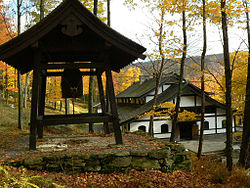| Dai Bosatsu Zendo Kongo-ji | |
|---|---|
 | |
| Religion | |
| Affiliation | Rinzai |
| Location | |
| Location | 223 Beecher Lake Road, Livingston Manor, New York 12758-6000 |
| Country | United States |
 | |
| Architecture | |
| Founder | Soen Nakagawa Roshi & Eido Tai Shimano Roshi |
| Completed | July 4, 1976 |
| Website | |
| http://www.daibosatsu.org | |

Dai Bosatsu Zendo Kongo-ji, or International Dai Bosatsu Zendo Kongo-ji, is a Rinzai Zen monastery and retreat center located in the Catskill Mountains of upstate New York. Dai Bosatsu Zendo Kongo-ji is part of the Zen Studies Society, founded in 1956 to support the work of D.T. Suzuki. It is affiliated with New York Zendo on the Upper East Side of Manhattan. Zen Studies Society was led by Shinge-Shitsu Roko Sherry Chayat Roshi until her retirement in 2023. The Zen Studies Society community celebrated the installation of Abbot Chigan-kutsu Kyo-On Dukuro Jaeckel Roshi on November 24, 2023.